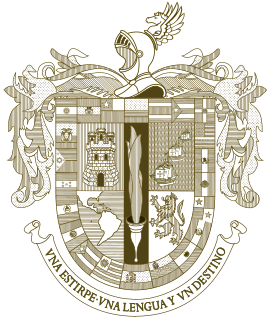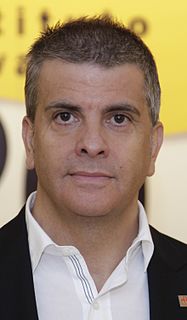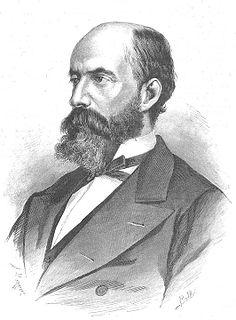This article is being considered for deletion in accordance with Wikipedia's deletion policy. Please share your thoughts on the matter at this article's deletion discussion page. |
Delfin Carbonell Basset is a contemporary lexicographer in the United States and creator of the Unialphabet system.
Carbonell Basset was born in Spain in the 20th century. He was educated in the United States, in Duquesne University in Pittsburgh, Pa. and later joined the faculty of Franklin & Marshall College in Pennsylvania. According to articles written about him in the Spanish newspaper La Razón, by José María Carrascal, he compiles dictionaries on his own, with no teams of experts. He is the creator of the Unialphabet system for bilingual dictionaries, where they are not divided into two languages. This was first used in his Spanish and English Dictionary of Idioms and in The new Dictionary of Current Sayings and Proverbs, Spanish and English, foreworded by John Simpson, of the University of Oxford.
For over twenty years, Carbonell Basset was the Director of the Marshall Institute of Languages in Madrid, Spain.
Ed. of La lengua de Cervantes, Julio Cejador, with Dr. James A. Parr (ED. Serbal, 2011)

The Royal Spanish Academy is Spain's official royal institution with a mission to ensure the stability of the Spanish language. It is based in Madrid, Spain, and is affiliated with national language academies in 22 other hispanophone nations through the Association of Academies of the Spanish Language. The RAE's emblem is a fiery crucible, and its motto is Limpia, fija y da esplendor.

Charro has several meanings, but it generally refers to Mexican horse riders, who maintain traditional dress, such as some form of sombrero, which in Mexican Spanish are called sombrero de charro. The charros could also be thought of as old Mexican cowboys who dress like such, although more modern dress is now seen on those who still work the ranches (rancheros). See also, vaquero.

A cantina is a type of bar common in Latin America and Spain. The word is similar in etymology to "canteen", and is derived from the Italian word for a cellar, winery, or vault. In Italy, the word cantina refers to a room below the ground level where wine and other products such as salami are stored.

The Association of Academies of the Spanish Language is an entity whose end is to work for the unity, integrity, and growth of the Spanish language. It was created in Mexico in 1951 and represents the union of all the separate academies in the Spanish-speaking world. The association publishes reference works on the Spanish language and commemorative editions of Hispanic literature, among other publications.

Spanish orthography is the orthography used in the Spanish language. The alphabet uses the Latin script. The spelling is fairly phonemic, especially in comparison to more opaque orthographies like English, having a relatively consistent mapping of graphemes to phonemes; in other words, the pronunciation of a given Spanish-language word can largely be predicted from its spelling and to a slightly lesser extent vice versa. Notable features of Spanish punctuation include the lack of the serial comma and the use of inverted question and exclamation marks: ⟨¿⟩ ⟨¡⟩.

Standard Spanish is a linguistic variety, or lect, of the Spanish language, dominantly used in its written form. There are different standard forms, including the Mexican standard, the Latin American standard, the Peninsular standard or European standard and the Rioplatense standard, in addition to the standard forms developed by international organizations and multinational companies. The term norma culta, 'cultivated norm' is often applied to standard Spanish. The RAE defines standard Spanish as the norm of cultivated, formal speech.

An hidalgo or a fidalgo is a member of the Spanish or Portuguese nobility; the feminine forms of the terms are hidalga, in Spanish, and fidalga, in Portuguese and Galician. In popular usage, the term hidalgo identifies a nobleman without a hereditary title. In practice, hidalgos were exempted from paying taxes, yet owned little real property.

The Diccionario de la lengua española, previously known as Diccionario de la Real Academia Española, is produced, edited, and published by the Royal Spanish Academy (RAE) with participation of the Association of Academies of the Spanish Language. It was first published in 1780, and subsequent editions have been published about once a decade. The twenty-third edition was published in 2014; it is available online, incorporating modifications to be included in the twenty-fourth print edition.
The Unialphabet system of classification for bilingual wordbooks, created by the Spanish lexicographer Delfin Carbonell Basset, blends both languages into one single body of facts rather than employing the traditional two-part method. This way, the user can go straight to the word, not minding whether he or she is in the English or Spanish part, making it easier to check the words or expressions in either language. The parallel lexicographical quality control is assured as the foreign counterpart word or idiom can be easily checked out.

Francisco Moreno-Fernández is a Spanish dialectologist and sociolinguist.
Francisco Javier Santamaría was an influential Mexican writer and politician who is best remembered for his contributions to the study of Mexican literature and lexicography; he variously worked or published as a bibliographer, essayist, geographer, journalist, judge, lawyer, lexicographer, linguist, naturalist, pedagogue, philologist, and poet. He also served as a Senator of the Republic and as Governor of the State of Tabasco.
Alfonso Rodríguez Vallejo was a Spanish playwright, poet, painter and neurologist. He had published 34 plays and 25 poetry books. Vallejo was awarded the Lope de Vega prize in 1976 for his play "El desgüace". "Ácido Sulfúrico" was the runner up prize in 1975. In 1978 he received the Internacional Tirso de Molina prize for his work A Tumba Abierta. The Spanish Royal Academy, in 1981, awarded Vallejo the Fastenrath Award for "El cero transparente".
Agustín Blánquez Fraile was a Spanish scholar, Latinist, historian and librarian.
The Breve diccionario etimológico de la lengua castellana is an etymological dictionary compiled by the Catalan philologist Joan Corominas (1905–1997), and first published in 1961—with revised editions in 1973, 1993, and 2008—by Gredos in Madrid.

Diego Martínez Torrón is a professor of Spanish Literature at the University of Córdoba, Spain, and a writer, author of essays, poetry and novels. He has been a speaker at many of the major universities in Europe and the United States. A specialist in nineteenth and twentieth century Spanish literature he has published numerous books on Spanish Romanticism, with interpretive contributions and unpublished texts. He has edited the most faithful edition of the complete works of authors such as José de Espronceda and the Duque de Rivas. He has also written about Lista and Quintana and the work of Spanish progressive liberals from the early nineteenth century to the end of the period of Romanticism. He has studied the poetic thought of Juan Ramón, Octavio Paz and José Bergamin. He has also dedicated numerous studies to the works of Cervantes. He has studied the narrative of Álvaro Cunqueiro, Juan Benet, Azorín and has published the first annotated edition of El Ruedo Ibérico of Valle-Inclán. His concept of literary methodology stems from a new, non-Marxist approach to the binomial ideology and literature. He has edited Don Quixote, studying the thinking of Cervantes.
Félix Ramos y Duarte (1848–1924) was a Cuban educator and writer, who was exiled from Cuba in 1868. He moved to Yucatán, Mexico and later lived in Veracruz and Mexico City. He compiled the first dictionary of terms that were specifically "Mexican Spanish". Ramos returned to Cuba after it gained independence from Spain. He taught briefly and then served as President of the Teacher Examination Board. He published many textbooks and educational articles.

Francisco Darío Villanueva Prieto is a Spanish literary theorist and critic, and is the director of the Royal Spanish Academy as of 11 December 2014. He has been a member of the academy since 2007, and he occupies the chair corresponding to the letter D.

Eduardo Saavedra, Spanish engineer, architect, archaeologist and Arabist, member of the Real Academia de la Historia, Spanish Royal Academy of Sciences, Real Academia Española and cofounder-president of the Real Sociedad Geográfica.
The Festival of Spanish Theatre of London (FesTeLõn) has taken place in June every year since 2013, when it opened at the Greenwood Theatre, with a production of El Diccionario by Manuel Calzada, a play about the lexicographer María Moliner, with Vicky Peña starring in the lead role. Its objective is to bring contemporary theatre beyond the borders of Spain, working with professional Spanish theatre companies. The plays are usually performed in Spanish with English surtitles in order to ensure that they are accessible to the widest possible audience. The festival also includes a full programme of related talks and workshops to complement the stage performances, as well as bilingual “meet the cast” sessions, with Q&A.
Awkward Hands is a 1970 Spanish western film directed by Rafael Romero Marchent, written by Santiago Moncada and Joaquín Romero Hernández, and starring Peter Lee Lawrence, Alberto de Mendoza and Pilar Velázquez.